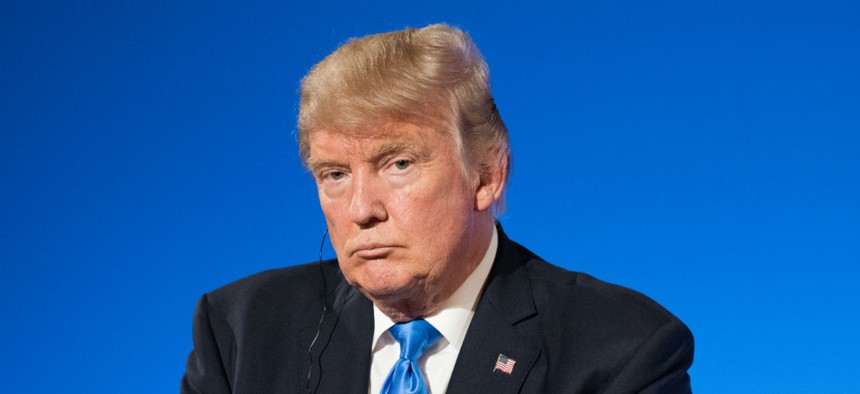If there’s any lesson from Donald Trump’s first six months as president, it’s that any prediction is wildly risky. New York Yankee great Yogi Berra must have had this moment in mind when he said, “It's tough to make predictions, especially about the future.”
But let’s give it a stab. Here are six lessons we might glean as we mark the 1/8th point of the Trump presidency.
1. Political conversation has been indelibly coarsened. We’ve been teetering on the edge of greater incivility for a long time, but the administration’s sharp elbows will make it very hard to go back. Of course, it’s easy to pine for days that never existed. Fortunately, it would be hard to top the street brawls surrounding the 1972 Democratic National Convention in Chicago. But we’ve clearly crossed a line in the last months, in which ad hominem attacks are more common, more nasty, and more pointed. It’s hard to imagine that we’ll easily get back to the civil side of the line, even if future candidates promise they’ll do so, as they surely will.
2. Future presidents won’t rely on conventional media outlets to get their message out. Future officials might not be the Twitter aficionado that Trump is. Twitter might not even be Twitter in the fast-moving next generation of political conversation. My college students, in fact, don’t much like Facebook, especially because they don’t like using the same social media as their parents. But, in his first six months, Trump has succeeded in doing what presidents for generations have yearned to do: escape the media’s power to mediate their conversation with Americans. With 34 million followers, Trump can immediately reach a vast audience—much larger than the 2.3 million viewers that Fox News, the most-watched cable news channel, attracts in prime time. He’s turned off the cameras at daily White House press briefings and has gotten away with it. There’s not a president since Lyndon B. Johnson (if not before) who wouldn’t have loved to make the White House press corps vanish and talk directly to citizens. There’s no going back.
3. Since the media no longer mediate, they’ll choose up sides. Reporters are spending less time reporting the news and more time interpreting it. That’s been going on for some time, but it’s become a major driver since Trump took office. More news has attitude, and the media have found that viewership and all-important Internet hits depend on writing headlines that grab partisans. News is less and less about tuning in to find out what’s going on. It’s more and more about climbing into an echo chamber that feels right.
4. The line between news and entertainment is being erased. And that, in turn, has shrunken the distance between news and late-night talk, where viewers are tuning in to sharp-tongued comedians. Comedians quietly say that Trump is a target-rich environment, compared with Barack Obama. He’s easier to imitate, and he produces vastly more material for jokes, at least for the 60 percent of the country not part of his base. Future presidents might not be as much fun for comedians, but they’ve taken their game up a notch during the Trump administration, and they’ve been rewarded with higher ratings. They’re not going to put down the game that they’re handily winning.
5. Presidents don’t need to rush to make political appointments. The conventional wisdom before January 20 was that presidents need to make their political appointments fast—and that what separated good from bad presidents was how quickly and how well they did it. At six months, Trump lags far behind any president since George H.W. Bush in filling out his team. He’s got only one-quarter the number of appointees in place as Obama had at this point, and it’s taking him longer to get appointees confirmed, even with a Republican Senate. The lack of a team-in-place has had big consequences, especially in departments like State that rely heavily on judgment. But without political appointees in place, he’s been able to roll decisions out fast. The budget and management plans he’s charged the agencies with producing have had interesting nuggets inside. Despite the delays in making appointments, the government (at least so far) hasn’t collapsed. So, when future presidents are told, “You need to be ready to govern from Day 1, and to get your team in place ASAP,” they’ll ask, “Why?” Analysts and advisers and experts are going to need new answers.
6. There’s no reason why the crazy has to stop. Democrats and anti-Trumpers have, since the first days of the campaign, been saying, “Now he’s really crossed the line—he’s done for.” It’s turned out that either there’s no line, or that it can be so easily moved that the argument doesn’t hold. Of course there’s a good chance that, at some point, citizens will decide that Trump really has taken a step too far. But, in the meantime, the first six months teach us that the line can easily be erased or shifted. Most public reaction to Donald Trump, Jr.’s release of the emails about his meeting with Russians, was at least initially, “Meh.” That could easily lead to even riskier behavior on the part of White House officials.
Trump’s first six months have been a profound disappointment for conservatives, who love the theater but wanted more policy action. They’ve been a source of terror for liberals, who fear for the future of the country. He might find a way to get the government’s transmission into gear and getting his policy machine rolling. He might get so trapped in crosscutting charges that his presidency becomes a nonstop spin machine.
But, so far, he’s defied every hope and fear. He’s unquestionably changed the presidency. And he’s proven Yogi right.
Image Frederic Legrand-COMEO/Shutterstock.com.




